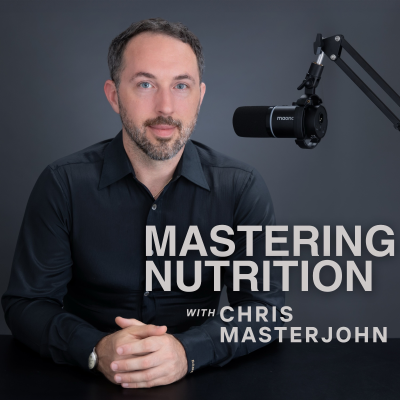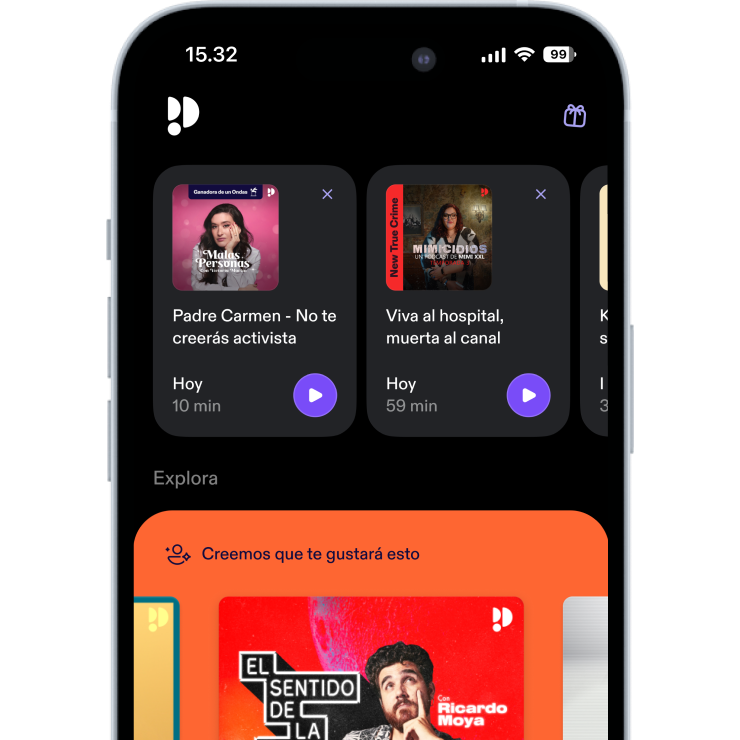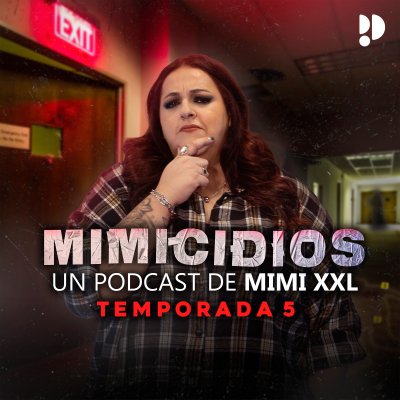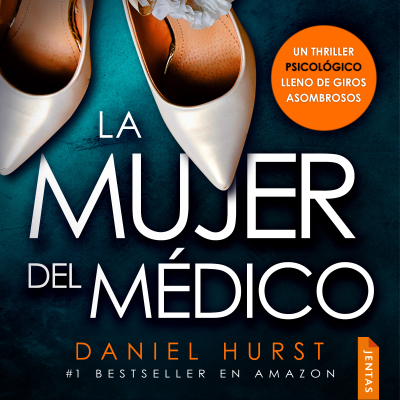
Mastering Nutrition
Podcast de Chris Masterjohn, PhD
Disfruta 30 días gratis
4,99 € / mes después de la prueba.Cancela cuando quieras.

Más de 1 millón de oyentes
Podimo te va a encantar, y no sólo a ti
Valorado con 4,7 en la App Store
Acerca de Mastering Nutrition
Welcome to the Mastering Nutrition podcast. Mastering Nutrition is hosted by Chris Masterjohn, a nutrition scientist focused on optimizing mitochondrial health, and founder of BioOptHealth, a program that uses whole genome sequencing, a comprehensive suite of biochemical data, cutting-edge research and deep scientific insights to optimize each person's metabolism by finding their own unique unlocks. He received his PhD in Nutritional Sciences from University of Connecticut at Storrs in 2012, served as a postdoctoral research associate in the Comparative Biosciences department of the University of Illinois at Urbana-Champaign's College of Veterinary Medicine from 2012-2014, served as Assistant Professor of Health and Nutrition Sciences at Brooklyn College from 2014-2017, and now works independently in science research and education.
Todos los episodios
726 episodiosFor a long time, most people believed that when we exercise, our muscles make lactic acid, this acidifies the muscles, and the acidity contributes to contractile failure, fatigue, and delayed-onset muscle soreness. Some people still believe this. You may have heard the argument against it from well-known figures like Andy Galpin, or, if you’re deep into the science, you may have read the work of George Brooks. In this lesson, we are going to cover the biochemistry of lactate production. We will see that we never make lactic acid, ever. We make lactate. Making lactate is fundamentally alkalinizing. We will take a look at the presentation of glycolysis in the Berg and Lehninger biochemistry textbooks to see that, on the one hand, they give us everything we need to know to understand that the human body never makes lactic acid, but, on the other hand, they really do not equip us well to understand where acidity does comes from during exercise. This is because they do not consider acid-base balance important enough to completely present the proton balances of the chemical reactions. Finally, we will cover what does cause muscular fatigue, take a look at the research on lactate supplements, and come to some conclusions about the best way to manage acidity during exercise to maximize performance. This is part of a larger course on the biochemistry of how we derive energy from food and use it to fuel our wellness, performance, and longevity. Take the full course here: https://chrismasterjohnphd.substack.com/p/masterclass-with-masterjohn-energy [https://chrismasterjohnphd.substack.com/p/masterclass-with-masterjohn-energy] To see the slides, watch this lesson on youtube: https://www.youtube.com/watch?v=IrpbLllsSHQ [https://www.youtube.com/watch?v=IrpbLllsSHQ] To obtain the written version with timestamped slides for better studying, see here: https://chrismasterjohnphd.substack.com/p/how-lactate-alkalinizes-your-muscles [https://chrismasterjohnphd.substack.com/p/how-lactate-alkalinizes-your-muscles] This lesson is free for one week. After that it will be reserved for Masterpass members. You can learn more about the Masterpass here: https://chrismasterjohnphd.substack.com/about [https://chrismasterjohnphd.substack.com/about] You can subscribe to the Masterpass here: https://chrismasterjohnphd.substack.com/subscribe [https://chrismasterjohnphd.substack.com/subscribe] 2:52 How textbooks present glycolysis 3:36 What is acidity? 4:32 The acidfying and alkalinizing phases of glycolysis 7:09 Glycolysis: A brief review 10:08 The Principles 29:33 The Reactions -- and Where the Textbooks Go Wrong 38:59 Human beings do not make lactic acid 42:13 Lactate transport is even more alkalinizing to muscle 47:44 Robert Robergs Fights an Uphill Battle in Clarifying the Sources of Acidity and the Alkalinizing Effect of Lactate 1:01:08 What causes fatigue? 1:05:15 Does CO2 contribute to acidity? 1:13:45 Where is Glycolysis Getting Backed Up? 1:23:10 Conclusiuons: What's realy going on with exercise-induced acidosis. 1:26:34 Lactate supplements 1:30:53 How to use this information in training for optimal performance.
D-lactate is commonly stated to be exclusively a microbial metabolite. This is found in assumptions within the medical literature for decades even when it was long-known to be false. While D-lactate is indeed made by bacteria, D-lactate is also inarguably and irrefutably produced by human enzymes. In this podcast, moreover, I will argue the following: Microbial contribution to D-lactate in humans under normal circumstances is negligible. I coin the term “the D-lactate shuttle” to describe a role for D-lactate that should eventually make its way into biochemistry textbooks alongside the malate-aspartate shuttle and the glycerol phosphate shuttle. The D-lactate shuttle operates alongside these other shuttles to balance the priorities of conserving cytosolic NAD+, reducing cytosolic acidity, bypassing complex I, or generating ATP. It is uniquely useful as a shuttle when there is an absolute deficit of niacin or NAD(H). D-lactate is an important contributor to gluconeogenesis that could account for up to 11% of it and rival an individual amino acid. While D-lactate concentrations in human plasma are infinitesimal, when the downstream metabolism of D-lactate and L-lactate are blocked by genetic disorders, the concentrations of the two forms are similar in plasma. This contrasts wildly with the common claim that flux through D-lactate is “minuscule.” Most likely D-lactate is produced in considerable quantities in liver and kidney but is rarely secreted into plasma because doing so would risk neurotoxicity. D-lactate should be taken seriously for its potential role in Parkinson’s and in neurological problems generally, for its role in diabetes, and for its extremely underappreciated roles in glycolysis, gluconeogenesis, and the respiratory chain. Oxalate powerfully impairs D-lactate clearance, so D-lactate should be investigated as a potential link between oxalate and autism, and oxalate-lowering strategies should be seen as a way to improve D-lactate clearance and reduce its potential role in diabetes and neurological disorders. See the sections on riboflavin, zinc manganese, and glutathione in Testing Nutritional Status: The Ultimate Cheat Sheet, as well as Does CoQ10 Deserve a Spot on Your Longevity Plan? and the How to Detox Manganese guide for managing the relevant nutrients. Read the written version for live links and references: https://chrismasterjohnphd.substack.com/p/d-lactate-groundbreaking-research [https://chrismasterjohnphd.substack.com/p/d-lactate-groundbreaking-research]
In this podcast we cover elevated creatinine, insomnia, cramps constipation, water retention, hair loss, irritation and anger, lightheadedness during lifting, bloating, aggravation of restless leg syndrome, irritation of asthma, bloody noses, anxiety, headaches, heart palpitations, twitching, and fast or slow heartbeat. The full podcast and article can be found here: https://chrismasterjohnphd.substack.com/p/handling-creatine-side-effects [https://chrismasterjohnphd.substack.com/p/handling-creatine-side-effects] https://substack.com/profile/116592149-kin-hang-lam?utm_source=post-reactions-face
Creatine is like your second mitochondria. Or, the mitochondria’s chief of staff. Or its co-pilot. Your mitochondria make ATP so you can see clearly, hear accurately, digest your food, power your brain, show off your your shiny skin, lift heavy things, and perform your best at the challenges you face. They do that all with the help of creatine. Creatine is responsible for spreading the impact of mitochondrial ATP production into the general area of the cell known as the cytosol, and into every organelle outside the mitochondria. While it is more important in cells with high ATP requirements, variable ATP requirements, and long distances between mitochondria and the source of ATP utilization, it is still incredibly important in every cell. There is no point in optimizing your mitochondria if you don’t also optimize your creatine. Many people may believe that the high muscle creatine stores that athletes achieve with creatine supplements are “unnatural” and something not achievable until creatine supplements were available. Here, I argue that nothing could be further from the truth. Every muscle fiber wants to be exactly as rich in creatine as achieved with creatine supplementation. All of your cells want to be rich in creatine. Your brain is dying to be this rich in creatine. Your muscles are starving to be this rich in creatine. It is completely natural to be this rich in creatine, yet most of us in the modern era who don’t supplement just aren’t that optimized. The creatine we require to be optimized is likely etched deep into our beings by our ancestral consumption of one to two pounds of meat per day. When red and rare, one pound can give the dose that saturates tissue stores. When white and well done, two pounds may be required. But can we synthesize enough creatine ourselves when all the precursors in place? Here we examine that question. But first, a brief review of creatine’s lesser known benefits. This is educational in nature and not medical or dietetic advice. The article version has live links, graphs, and references: https://chrismasterjohnphd.substack.com/p/your-cells-are-starving-for-creatine [https://chrismasterjohnphd.substack.com/p/your-cells-are-starving-for-creatine] Handling Creatine Side Effects will be released as a podcast tomorrow but is available as a written article right now: https://chrismasterjohnphd.substack.com/p/handling-creatine-side-effects [https://chrismasterjohnphd.substack.com/p/handling-creatine-side-effects]
Question: Is whole food vitamin C superior to natural because it is part of a tyrosinase complex? Short Answer: Vitamin C is nearly ubiquitously distributed in plant tissues, and is never bound to any enzyme as a structural complex. Vitamin C promotes absorption of iron from plant foods, inhibits copper absorption, and de-loads copper from ceruloplasmin, which may play a role in distributing copper to tissues. Vitamin C is not capable of destroying ceruloplasmin. These functions follow directly from vitamin C as an electron donor and there is no evidence whatsoever that whole food vitamin C behaves differently in these respects than synthetic vitamin C. However, daily needs in most contexts are 2-400 milligrams of vitamin C per day, which is below the dose shown to potentially cause problems with copper. Getting this from whole foods or whole food supplements is better than using synthetic vitamin C because it avoids GMO corn and Chinese synthetics and provides a host of other beneficial constituents alongside the vitamin C. This is a clip from a live Q&A session open to CMJ Masterpass members. In addition to this episode, you can access two other free samples using this link: https://chrismasterjohnphd.substack.com/p/questions-on-hair-trace-mineral-analysis [https://chrismasterjohnphd.substack.com/p/questions-on-hair-trace-mineral-analysis] In that batch of free episodes you will also find the answer to this question: * Is Hair Mineral Testing Useful? * What's the Deal With Seed Oils? If you want to become a Masterpass member so you can participate in the next live Q&A, or so you can have access to the complete recording and transcript of each Q&A session, you can save 10% off the subscription price for as long as you remain a member by using this link to sign up: https://chrismasterjohnphd.substack.com/qanda [https://chrismasterjohnphd.substack.com/qanda] Learn more about the Masterpass here: https://chrismasterjohnphd.substack.com/about [https://chrismasterjohnphd.substack.com/about] This snippet is from the June 16, 2023 AMA. The full recording and transcript is reserved for Masterpass members. Here is a preview of what’s included: * Butyrate for Hashimoto’s? What else? * What in the comprehensive nutritional screening is helping to interpret lactate/pyruvate and ketone ratios? * Is the solution to a respiratory chain disorder to take Niagen? * If I have high manganese on an HTMA, do I need to detox? * Should CFS patients target reducing their serum BH4? * What to do about low alkaline phosphatase? * If my glucose spikes above 140, should I eat fiber and take ACV before the meal, eat cinnamon with the meal, chew slowly, and move for ten minutes after my meals? * Difficulty getting Quest to do the lactate/pyruvate ratio correctly. * Is 38 milligrams of niacinamide enough to rule out niacin deficiency as a cause of low NAD+? * How does optimizing body composition help optimize energy metabolism? Can impaired energy metabolism make someone fatter? * Is monounsaturated fat the best fat? * Manganese followup. * Do you need to stop taking biotin before a biotin test? * What in "a bunch of supplements" flip the lactate/pyruvate ratio from high to low? * NAD infusions, yay or nay? * Why do I feel better after a warm shower, even better than after sunshine? * Should I cut back on vitamin A if I have toxicity symptoms but cutting back makes me get sick? * Do home blood drop tests have to be pricked at the finger? * Is it true that my boyfriend was just born a night owl? * How much eating out is too much? * When measuring ketones, lactate, and glucose at home to optimize energy metabolism, what time of day should we take the measurements? Here’s a link to the full AMA: https://chrismasterjohnphd.substack.com/p/recording-and-transcript-of-the-augusthttps://chrismasterjohnphd.substack.com/p/recording-and-transcript-of-the-june-a55 [https://chrismasterjohnphd.substack.com/p/recording-and-transcript-of-the-june-a55] Access the show notes, transcript, and comments here [https://chrismasterjohnphd.substack.com/p/330-is-whole-food-vitamin-c-really].

Valorado con 4,7 en la App Store
Disfruta 30 días gratis
4,99 € / mes después de la prueba.Cancela cuando quieras.
Podcasts exclusivos
Sin anuncios
Podcast gratuitos
Audiolibros
20 horas / mes

































